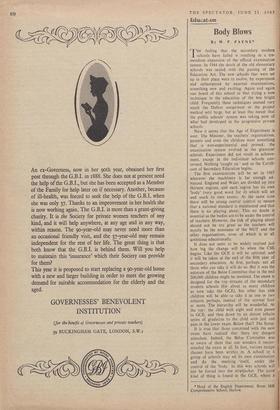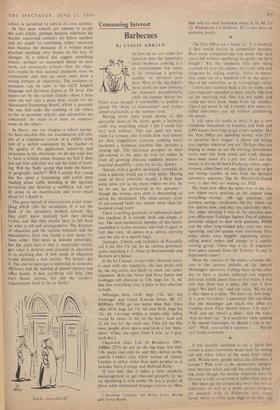Education
Body Blows
By W. P. PtYNE*
rin El E feeling that the secondary modern I schools have failed is resulting m a tre- mendous expansion of the official examination
system. In 1944 the death of the old elementary schools was sealed with the passing of the Education Act. The new schools that were set up in their place were to evolve, by experiment and unhampered by external examinations, something new and exciting. Again and again one heard of this school or that trying a new
technique in the education of the less bright child. Frequently these techniques seemed very
much the Dalton assignment or the project method writ large, but at least this meant that the public schools' system was taking note of what had developed in the progressive private schools.
Now it seems that the Age of Experiment is over. The Minister, the teachers' organisations,
parents and even the children want something
that is non-experimental and proved: the examination system evolved in the grammar schools. Experiment did not result in achieve- ment, except in the individual schools con- cerned. Nothing 'caught on ' and so the Certifi- cate of Secondary Education begins.
The first examinations will be set in 1965 wherever the machinery is far enough ad- vanced. England and Wales are divided up into thirteen regions, and each region has its own `body' (very good word for it) which will set and mark its own exams. At the same time there will be strong central control to ensure that a national standard is maintained and that there is no playing about. This no doubt is essential as the bodies are to be under the control of teachers. However, the risk of playing about should not be too great as the teachers will mostly be the nominees of the NUT and the other organisations, none of which is at all ambitious educationally.
It does not seem to be widely realised just how big the change will be when the CSE begins. Like the GCE it will be optional. and it will be taken at the end of the fifth year of secondary education. At first, perhaps. not all those who can take it will do so. But it was the estimate of the Beloe Committee that in the end 200,000 children might be involved. The exam is designed for the top streams of the secondary modern schools (for about as many children as now take the GCE), but other less able children will be able to take it in one or two subjects perhaps, instead of the normal four or more. The hierarchy will be wonderful. At the top: the child with eight and nine passes in GCE, and then down by an almost infinite series of gradation to the child with just one pass in the lower exam. Below that? The Sump.
It is true that those concerned with the new exam have realised that there are dangers attendant. Indeed, the Beloe Committee was so aware of them that one wonders it recom- mended the exam at all. In fact, various escape clauses have been writtea in. A school or a group of schools may set its own examination and do the marking itself, under the control of the 'body: In this way schools will not be forced into the straitjacket. The same kind of thing is found in the GCE, where a
* Head of the English Department, Burnt Mill Comprehensive School, Harlow. school is permitted to submit its own syllabus.
In fact most schools are content to accept the table d'hote, perhaps because otherwise the teacher concerned commis his fellow teachers and his pupils to something rather uncertain and because the demands of a written exam preclude anything very drastic in the way of changes. if a school did suggest something drastic—perhaps an assessment based on term work, not necessarily writien—then the objec- tion would be that national standards must be maintained, and that an exam must have a strong element of objectivity. The tendency to sameness can be seen in the GCE English language and literature papers at '0' level. The Papers set by the various boards—those I have seen—do not vary a great deal, except for the Associated Examining Board, which is precisely the one that lacks the standing of the others so far as grammar schools and universities are concerned. Its exam is at least an improve- ment on the others.
In theory, one can imagine a school saying: we have decided that our examination will con- sist of a continuous review of a child's work and of a skilled assessment by his teacher of the quality of his application, sensitivity and awareness in the classroom; we do not want him to have a written exam, because we feel it does not suit him and does not suit his kind of learn- ing. Will the 'body' accept that from the history or geography teacher? Will it accept that young Joe has spent a fascinating and useful term reading about cattle breeding in the agrarian revolution and deserves a certificate but can't sit down in an examination and write much about it? I doubt it.
This great spread of examinations is not some- thing which calls for accusation. It is not the fault of the secondary modern schools that they don't know precisely how they, should evolve, and that they should have to fall back on what is old and unimazatative. The directors of education and the various ministers and the educationists have not found a new mode for them either. One hates to become unworldly, but the plain fact is that a materialist society gets what it deserves and demands in education as in anything else. A new mode of education would demand a new society. We haven't got it. The one we have got is interested in economic efficiency and the making of passive factory and office hands. A new certificate will help. One can't blame anyone, but did the teachers' organisations have to be so docile?
'Lucky sonovabitchP



































 Previous page
Previous page